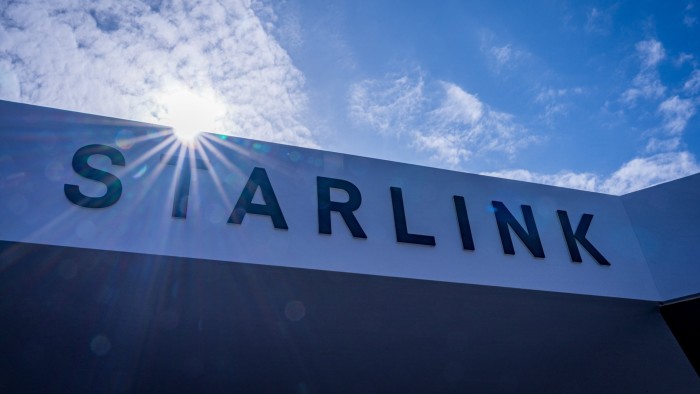Unlock the Editor’s Digest for free
Roula Khalaf, Editor of the FT, selects her favourite stories in this weekly newsletter.
Spanish and Portuguese mobile and internet users turned to Elon Musk’s Starlink in record numbers on Monday, as a widespread electricity blackout on the Iberian peninsula exposed vulnerabilities in telecoms networks.
Usage of the Starlink satellite communications service rose by 35 cent above average when telecoms coverage dropped in the two countries, according to data analysed by the Financial Times. Usage was 60 per cent higher in Spain than average on Tuesday, as mobile networks struggled to get back up to speed.
The data provided by internet access analyst Ookla showed “record” use of Starlink in the country with “thousands” of people using the service, according to Ookla’s Luke Kehoe, although the company declined to provide exact figures on usage.
The quality of Starlink coverage dropped as more users turned to the service but it did not cut out during the blackout, he added. While some Starlink ground stations in mainland Spain may have lost service, connections were possible to sites in other countries like Italy.
However, it is unlikely that satellite coverage would be widespread enough to provide coverage for millions of users during any similar blackout events in future. Users required enough charge in mobile devices to access the service.
Spanish grid operator Red Eléctrica has said it does not know the exact cause of the outage, which some experts have linked to the inability of Spain’s electricity grid to manage an unusually high supply of solar power.
Traditional mobile coverage in Spain and Portugal was severely impacted by the power outage, leading to calls for Spain’s mobile network to be made more resilient.
Network consistency, a metric of service reliability, fell to as low as half of its normal rate on Monday afternoon, Ookla found.
This came as many of the thousands of mobile antennas across Spain were knocked out by the loss of power, leaving only those with backup generation operating.
“Too many people were trying to access too few resources. That’s why during the recovery phase it was hard to get connectivity stable,” explained Claudio Fiandrino, a researcher at IMDEA Networks Institute in Madrid.
Telecoms networks frequently have backup generation at some sites but there are limits to their use.
Vodafone España said that backup generators had kicked in at 70 per cent of its sites in Spain when the outage began. But by 11pm, many regions still had low levels of mobile traffic, with regions including Galicia, Castilla La Mancha and Murcia having just 20 per cent coverage.
Telefónica, another large provider, said it “prioritised critical infrastructures for emergency services and hospitals by rationalising resource use” during the power outages, restoring 95 per cent of its mobile network within just over 24 hours and “full normality” by Thursday.
Ookla’s Kehoe said that Spain and Portugal are “not unique in terms of not having a significant presence of battery backup generators in the mobile site grid”.
In the UK, a recent report by Ofcom found that for short power blackouts, about two-thirds of the UK would be able to make emergency calls for at least one hour, thanks to backup generation for around a fifth of mast sites.
But fewer than five per cent of these sites have backup facilities of at least 6 hours. It would cost around £1bn to upgrade mobile networks to ensure four hours of access to contact emergency services for almost all people, Ofcom found.
Telecoms companies told Ofcom that the costs of providing backup are “prohibitive”, according to the February report.
Spanish and Portuguese telecoms companies run on “very tight margins” because prices are so low, Kehoe said. That makes investing in resilience harder than in the Nordics, for example, where average revenue per user is higher and where backup generation is stronger.
While the scale of Spain’s outage was unlike anything the country has experienced before, increasing extreme weather events are prompting governments to focus more on the resilience of telecoms networks.
In Norway, operators must fund battery backup of two hours in cities and four hours in rural areas. Australia has introduced publicly funded grants for operators to provide 12 hours of battery backup to sites in some remote areas.
The causes of the Spanish blackout remain undetermined, but its scale is likely to be “a clarion call for government and regulators to pay attention to resilience,” said Grace Nelson, an analyst at Assembly Research, a UK based research company.
Additional reporting by Kieran Smith
Read the full article here
